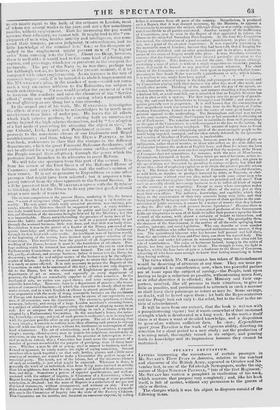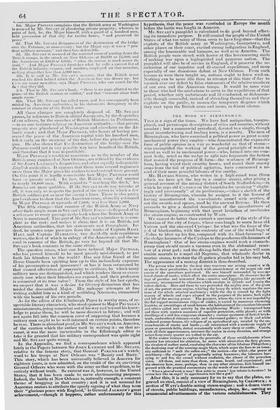STUARTS REFUTATION.
LETTERS impugning the correctness of certain passages in Mr. STUARTS Three YeIrs in America, relative to the conduct and character of the British Army, appeared in October and No %ember last, in one of the Ed:nburgh Newspapers, under the sig- nature of Major NORMAN PRENGLE, " late of the 21st Regiment. Mr. STUART has written a pamphlet in vindication of his work, which answers that purpose very completely ; and, like his book itself, is full of matter, without any pretension to the graces of style or diction. The charges which it was his object to disprove consist of the following items.
1st. Major Piusets complains that the British army at Washington is accused by Mr. Sremer of plundering private property; whereas, in point of fact, he, the Major himself, with a guard of a hundred men, held possession of that city for twelve hours, " and preserved its peace." 2d. That Mr. STUART disapproves of the destruction of the liridge over the Potomac, us unnecessary; but the Major says it MIS a " pru- dent military measure," and therefore defensible. 341. ;11r. Stealer is accused of the material error of putting down the British troops, in the attack on New Orleans, at 10,000 or 12,000, and
the Americans at :100 or 400; " when the rererse is mueh nearer the truth." And Major PRINGLE furnishes what he calls a correct list of the British infantry, seamen, and marines, employed on that occasion, making altogether less than 5,000 ince.
4th. It is said in Mr. STE sires account, that the Ileitis!' never reached the ditch behind which the American line was drawn up : but foae are many men alive, says Major Patsan.s, who can vouch for the fa 1 that they did.
5 h. Thin. in Mr. Sa-ma's book, " there is no page allotted to the praise of the British seaman or soldier," and that "censure alone finds ample room."
6th. That Mr. Stealer has relied anon, and has consequently been misled by, American iinthorities, in his statements derogatory to the conduct or character of the British arms.
All these charges are completely disposed of. Mr. STUART proves, by reference to British official docutnents, by the despatches of cur ollicers, by the speeches of British Ministers in Parliament, —in no one instance relying on American authority,—that private property seas plundered at Washington and elsewhere on the At- lantic coast ; and that Major PRINGLE, M110 boasts of having pre- served the peace of the American capital with his hundred men, left it early on the motility, of the day, before the plundering be- gan. Ile also shows that tlic destruction of the bridge over the Potomac could not in :Inv ptssible way have benefited the British, and therefore that it was unjustifiable. Major Pat confident assertions as to the number of the British army employed at. New Orleans, are refuted by the evidence of Sir JOHN LAM issisrs despatches, and other equally indisputable Eng/ish authorities. It appears that there were several regiments more than the Major gives his readers to understand were present. On this point it is hardly conceivable how Major PRINGLE could have ,0 grossly erred. In fact, the British unify did amount to nearly 10,000 men. With regard to " reaching the ditch," his iletnarks are mere quibbles. If Mr. STealer made any mistake at all, it was only as respects the period of t he action in which a few British soldiers got so near the enemy's lines. There is also pretty goo 1 evidence to show that the Americana army, absurdly estimated by Major PRINGLE at upwards of 7,000, was less than 5,000.
The fifth charge—that censure of the 111 itish Army or Navy alone (buds ample room in STUART'S Three rears—is disposed of by a reference to every passage in the book where time British Army or Navy is mentioned. This part of Mr. STUART'S refutation is as com- plete as the rest; and makes it clear, that it is on British, not American authorities, that his statements rest throughout. In- deed, he quotes some passages from the works of Captain Basle HALL and Captain II A murox, two decidedly anti-republican writers, the first of which in eulogy of the Americans, and the se- cond in censure of the British, go very far beyond all that Mr. STUART'S book contains in the same strain.
The question arises, what can have induced Major PRINGLE, who has proved himself to be most grossly misinformed, to put forth his blunders to the world? Ilas any false friend at the Horse Guards been spiriting him up to this melancholy exposure of his presumption and ignorance? or has it been occasioned by that absurd affectation of superiority to civilians, by which many military men are distinguished, and which renders them so exces- sively sore when their blunders are exposed, and their profession is estimated at its true value? From the style of his last epistle, we suspect that it was a desire for literary distinction that has misled the discomfited Major. His unhappy attempts at fine writing exhibit him as a kind of scribbling Narcissus, enamoured with the beauty of his own periods. As for the editor of the Edinburgh Paper (a worthy man, of re- spectable literary character), who stood sponsor to Major PRINGLE'S misstatements, going somewhat outof his way and beyond his know- ledge to praise them, he will be more discreet in future ; and will not again fall into the common error of supposing that because a unitary man ought to be well-informed on certain points, therefore he is so. There is abuudant proof, i n Mr. STUART'S work on America, of the caution which the author used in writing it : on that ac- count, it was the more inexcusable in the Edinburgh editor to take it for granted that his military correspondent was quite right and Mr. STUART quite wrong.
In the Appendix, we find a correspondence which appeared lately in the Papers between Sir JOHN LAMBERT and Mr. STUART, relative to the famous story, that General PAKENH AM'S watch- word to his troops at New Orleans was " Beauty and Booty." This story, which has been universally believed in America for eighteen years, is now admitted, on the credit of the six surviving General Officers who were with the army on that expedition, to be entirely without truth. So current was it, however, in the United States, that it has been made to serve electioneering purposes. Indeed, the battle at New Orleans is, naturally enough, a constant theme of bragging in that country ; and it is not unusual for American orators to attribute the speedy signing of what they term their "glorious peace with England," to General J AcKSON's great achievement,—though it happens, rather unfortunately for this
hypothesis, that the peace was coesinded id Europe the month before the battle was fought in &aerie*:
Mr. STUART'S pamphlet is calculated to do good beyond effect- ing its immediate purpose. It will remind the people of the United States of what too many of them seem to hare forgotten—that the exploits of the British army at Washington, Georgetown, and other places on their coast, excited strong indignation in England, among the honourable and humane, as well as in America. The British people were struck with horror at this buccaneering mode of making war upon a highspirited and generous nation. The pamphlet will also be of service in England, if it preserve the re- collection of our impolitic and ill-starred expeditions, and more especially of our disastrous defeat at New Orleans. From such lessons as were there taught us, nations ought to learn wisdom. Nothing can be more idle than to attempt at this time of day to varnish over our defeat by false statements of the relative numbers of our own and the American troops. It would be more wise in those who had the misfortune to serve in the expeditions of that period, whether only unfortunate and ill-conducted, or dishonour- able though successful, instead of obtruding themselves and their exploits on the public, to mourn the temporary disgrace which they cast upon the British arms and name, in decent silence.



















 Previous page
Previous page